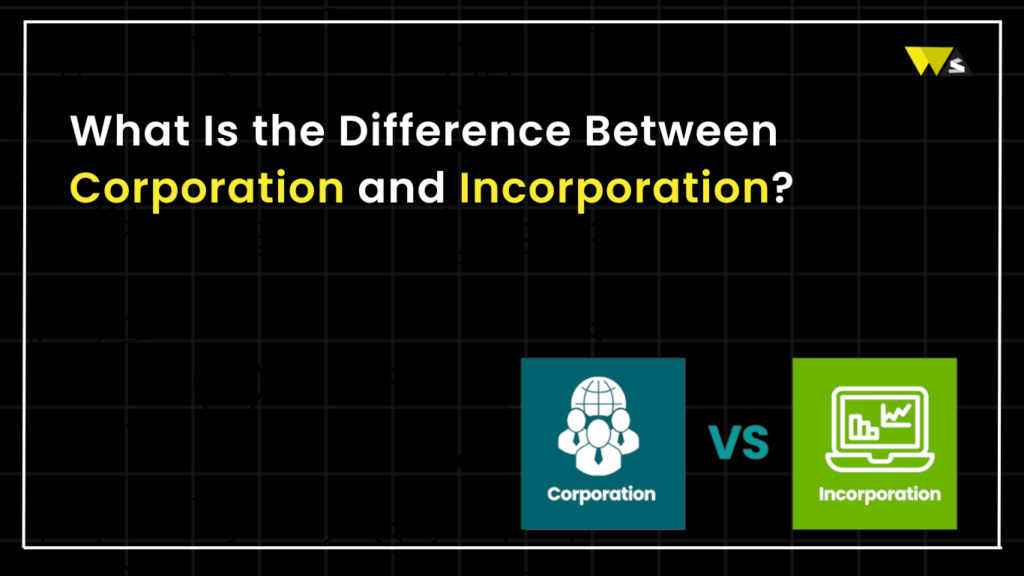The corporation is what has been assigned under that this legal term, incorporated is this indicative legal procedure that describes how an individual setting up a new business will function in a general way. For your company to be eligible for specific benefits or to fulfil requirements for different licensing processes, you might also need to incorporate. Therefore, let us know the difference between corporation and incorporation through this article.
What is a Corporation?
- In India, a business establishment where the shareholders also own the corporation is known as a company registration. It consists of many individual shareholders who own shares and have voting capability.
- The board of directors is made up of the shareholders, and this board runs the corporation.
- The two, the corporation and the owner, are generally treated as separate entities, though occasionally it is hard to regard them as such.
- The corporation may engage the aid of sub-corporations for certain functions such as distribution or production.
What is an Incorporation?
- The word incorporation describes the formal process of creating a new corporation. In order for a business to operate formally, the business needs to file articles of incorporation.
- These articles shall contain the corporation’s name, its purpose, the names of the directors, and other pertinent details prescribed by state law.
- The corporation becomes a separate entity from its owners after the articles are filed.
- Consequently, the owners are not held personally responsible for the corporation’s obligations and liabilities.
- Additionally, incorporation provides some tax advantages and can facilitate capital raising through the sale of stock.
Difference Between Corporation and Incorporation
- While corporations are the name given to a particular form of business structure in which company shareholders also control that business, incorporation is the process that specifies how an individual business will operate.
- A new business usually needs to be incorporated before it can start, but this isn’t always the case. Corporations are not required to be incorporated before they can begin operations.
- While only certain types of corporations can be taxed in this manner, corporations are typically taxed as C or S corporations. In general terms, incorporation is quicker and simpler than forming a corporation.
- Despite its paperwork load, corporations are subject to more stringent and intricate regulations than the majority of other businesses.
| Corporation | Incorporation |
| It is mostly abbreviated as CORP. | It describes the official registration of a business as a corporation. |
| It can be any kind of institution, including business, government or private sector organizations, or educational institutions. | For a startup business, it provides a number of benefits, such as limited liability. |
| The top officers and directors make investments by buying shares. | Its tax policies are listed beneath its products. |
| Forming a corporation facilitates obtaining funding from several sources to create shareholders. | Depending on the laws and regulations that specific areas adhere to, it differs from one nation to another. |
What are the Pros and Cons of Corporation?
- To reduce their liability, many people decide to establish a corporation.
- Because of this reason, the shareholders of a corporation are not liable for any debt incurred by the corporation.
- Hence, others can take this as a beneficial place to stay if they do not want to be liable for debts and damages caused by their business.
- However, establishing a corporation has certain drawbacks.
- Although it needs a lot more paperwork and expense than an ordinary business, incorporation helps protect shareholders from personal liability for losses made by the corporation.
- In addition, the corporations have to comply with more stringent obligations such as reporting, record keeping, and fulfilling certain tax responsibilities.
- There are also a number of additional benefits to forming your company as opposed to choosing a corporation.
- Your company can be incorporated, which would enable you to do business without restrictions on location or the nature of business activities undertaken.
- Another important consideration is that if any corporation’s revenue exceeds five million dollars annually, it would come under federal taxes as either an S corporation or a C corporation.
- There is no federal tax obligations related to incorporation if it is done before reaching this revenue threshold, unless later revenue exceeds it.
- The downside of being incorporated is that shareholders may face the risk of incurring personal liability, which could make them more vulnerable should something go awry with the company.
- When opting for the right pick for the business, it is most crucial to weigh very well the advantages and disadvantages involved.
What are the Pros and Cons of Incorporation?
- A private limited company permits the operations of a legal entity distinct from the owner; this, however, disallows profits and losses to be traced back to the individual.
- For a person starting their own business, or those that have just lost jobs and may now be looking into a strategy to save personal assets, this option is quite enticing.
- More tax benefits that are not available for unincorporated businesses are further provided by incorporation.
- However, incorporation can be time-consuming and cost-inhibitive, as it requires an initial package of documents to be submitted to the state of residence in order to formally register the business as a corporation.
- Furthermore, there are regulations governing the holding of shareholder meetings and the filing of annual reports with the government.
Conclusion
Corporation and incorporation are two terms that are very much related, but both represent different things in the business world. A corporation is the end product and a legal entity that conducts a business. Incorporation, which is a process by which a business entity is created, is completely distinct from the result itself, that, of the corporation.
The difference is definitely important for every individual taking part in the initiation or management of a business. Incorporation lays the groundwork of the legal and operational structure of the corporation; however, the corporation itself actually drives business activities, creates value, and contributes to the economy. Understanding these concepts will aid an entrepreneur and an individual in making informed decisions regarding their fast, successful, and long-lasting business.










